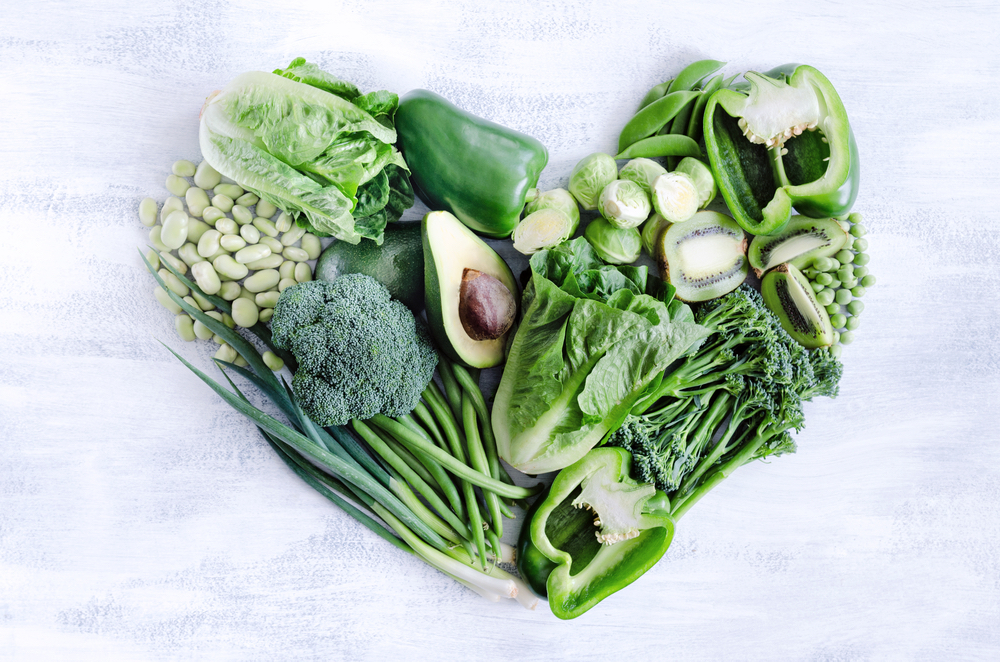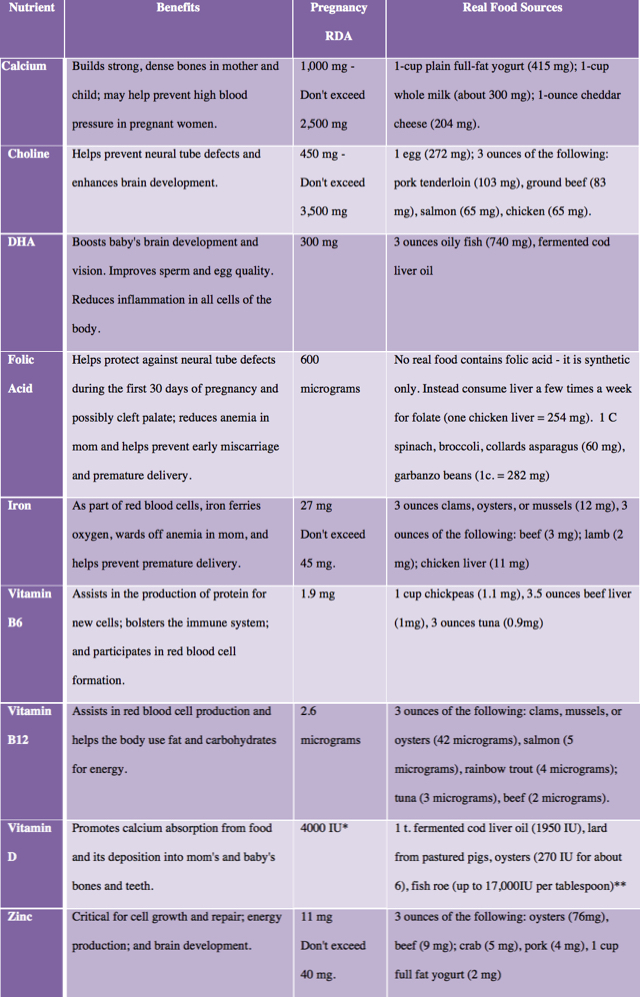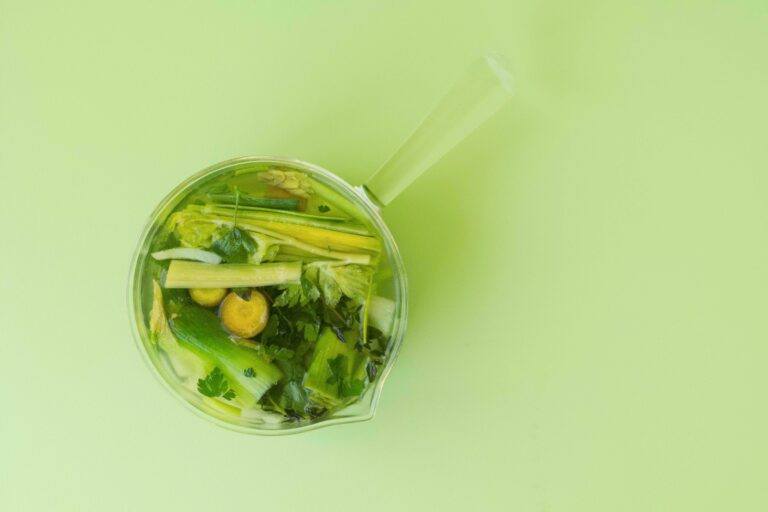It’s a pretty wild concept, I know. How could it be that in our “pill-for-every-ill, nutrition-in-a-bottle” world, swallowing handfuls of daily supplements might just be…. Unnecessary?
Here is, however, one way and one-way only. It’s called food. Real food, to be exact, the kind that sprouts up from the fertile ground or lives on green pastures. Fruits and vegetables teeming with antioxidants and vitamins, meats, eggs, and dairy products from humanely raised and properly fed animals, providing our bodies with the necessary raw materials for building flesh and bones, making hormones, blood and nerves.
How might this be different during pregnancy? In truth, it’s not different at all! Pregnancy is a time of high demand within the body, and resources should be plentiful to ensure a healthy mom and thriving baby. In fact, eating for fertility, conception, and pregnancy should ideally be set in place for a minimum of 3 months prior to conception.
All That in One Little Pill?
One of the big issues with prenatal vitamins is the amount of stuff crammed into one little pill. Broken down into categories, there are four distinct nutritional groups touted for optimizing prenatal nutrition: B vitamins, antioxidants, minerals, and omegas. Let’s take a look at what’s in each of these groups and figure out what kinds of real food equivalents we can eat to ensure adequate and optimal prenatal nutrition.
**When deficiencies abound, choosing targeted, high-quality individual supplements may be advisable. Top shelf, food-based supplementation can be an excellent adjunct to high quality, nutrient-dense food. Still, as the name suggests, supplements should never be more than a stopgap measure.
1. To B or not to B?
Perhaps the most significant (and certainly most talked about!) vitamin in the prenatal canon is a group of vitamins known as the “B’s,” and for good reason. B vitamins are vital for many bodily functions, including breaking down carbohydrates into glucose, breaking down fats and proteins, and detoxifying the body.
Most notable, perhaps, is B9, aka folate. Folate deficiency has been implicated in some very serious birth defects, including spina bifida and possibly cleft palate. So important is folate that many of the foods we consume, including breakfast cereals, breads, and grains, are fortified with the synthetic form of folic acid. Unfortunately, these “fortified” foods are not high-quality sources of folate. Quality folate comes from leafy green veggies (like spinach), legumes (especially garbanzo beans), and liver from pastured, grass-fed cows or chickens.
Folic acid supplementation is pretty much recommended across the board for pregnancy. Instead of relying on a prenatal vitamin for folic acid, consider a methylated b complex, like Yinova’s Bioactive Folate. This contains methylated B’s which are easier for the body to use and are especially important for anyone with the MTHFR gene mutation. So, instead of relying solely on a prenatal vitamin for folic acid, consider grabbing the nutrients from the food around you and combining it with a Bioactive folate supplement.
2. Antioxidants- for immunity and inflammation
The role of antioxidants in the body is to clean up the mess left behind by environmental toxins, which leads to inflammation and cell damage. Antioxidants also support healthy egg and sperm production. In the supplement department, there are a dizzying number of antioxidants to choose from, including vitamins C, D, E, glutathione, and coenzyme Q10. However, getting antioxidants from the diet is fairly straightforward.
Rich sources of antioxidants include fruits and veggies, particularly those of purple, red, orange, and other bright colors, and living foods like pastured raw eggs and raw oysters.
A note about vitamin D: there has been a lot of recent press surrounding the importance of vitamin D and its role in many bodily functions, including infertility, improvement in IVF outcomes, hormone support, and egg and sperm health. Like folic acid, many foods are “fortified” with vitamin D, though these sources are not acceptable for optimal health.
Vitamin D should ideally be synthesized by the body through sun exposure, though nutritious food sources including fish roe (17,000IU per TBS!!), oysters (270IU per half dozen), and lard from healthy foraging pigs are all excellent options.
If supplementing is the best choice due to lack of sun exposure or insufficient D-rich foods, be sure to supplement with D3 (not D2), or even better, Green Pastures Fermented Cod Liver Oil.
3. Minerals
Minerals are chemical compounds that are used for almost every bodily function, including building bones, making hormones, regulating your heartbeat, and keeping your cells hydrated through their role as electrolytes. Food that comes from organic, nutrient-rich soil is replete with minerals, yet another reason to buy organic produce from farms that practice sustainability.
Boosting your mineral intake through food is fairly simple. High-quality salts like Himalayan rock salt and grey Celtic sea salt can enhance any food, and bone broth from pastured and grass-fed animals (or wild-caught fish) is chock full of the spectrum of both trace and macro minerals.
Mineral levels can also be checked through blood work, so if your levels come back low, increasing food sources or choosing a high-quality individual supplement is your best bet.
4. Omega 3’s
Omega 3’s are a class of nutrients found abundantly in fish and fish oils. High quality fish oil, and particularly Green Pastures fermented cod liver oil (FCLO), is a supplement that I recommend to nearly all of my patients (save those with fish allergies). Omegas are vital to a healthy body, and support critical functions including hormone regulation, inflammation, blood flow and stress management. DHA, the most publicized of the omegas, is touted for its role in fetal brain development, though I encourage people to choose a full spectrum fish oil rather than just isolated DHA.
Pulling it All Together
Below is a chart from Feed Your Fertility outlining common nutrients found in prenatal vitamins and their food equivalents:
It’s important to note that what is lacking in prenatal nutritional recommendations are macro-nutrients, including carbohydrates, protein, and fats. These macronutrients, particularly saturated fat from healthy animal sources, are critical to the absorption of vitamins and minerals.
Also missing from the chart below is vitamin A, due to its toxicity in synthetic form. True vitamin A from animal sources, namely pastured liver and FCLO, is vital for fetal development and overall health. Consuming traditional foods including organ meats, pastured eggs, fermented foods, and full-fat, unpasteurized dairy is key to prenatal health. You can find lots more information, including recipes and guidelines in Feed Your Fertility.
Laura Erlich, LAc (FABORM) is the clinic director of Mother Nurture Wellness, in Los Angeles, CA. In addition to her clinical practice, she teaches continuing education classes to other acupuncturists and attends births as a doula. She is the co-author of Feed Your Fertility, Your Guide to Cultivating a Healthy Pregnancy Through Chinese Medicine, Real Food, and Holistic Living.





